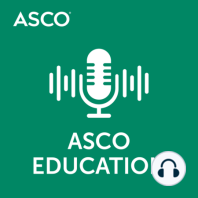4 min listen
Cancer Topics - Contrasting Cases: Cultural Barriers to Care
FromASCO Education
ratings:
Length:
7 minutes
Released:
Apr 22, 2020
Format:
Podcast episode
Description
Dr. Rodrigo Munhoz is a Melanoma/Sarcoma Oncologist at Hospital Sírio Libanês in São Paulo, Brazil. In today’s ASCO eLearning Podcast, Dr. Munhoz discusses two patient cases related to challenges and barriers to treating cancer in developing countries. While the two cases are similar, the recommended treatments can vary depending on social, economic, cultural, religious, patient knowledge and other aspects. We hope you enjoy this episode. To hear the latest eLearning Podcast episodes as soon as they are available, please subscribe on Apple Podcasts or Google Play. We truly value your feedback, so please leave a review. To access our entire library of podcasts and other amazing eLearning content, visit elearning.asco.org The purpose of this podcast is to educate and inform. This is not a substitute for medical care and is not intended for use in the diagnosis or treatment of individual conditions. Guests on this podcast express their own opinions, experience, and conclusions. The mention of any product, service, organization, activity, or therapy should not be construed as an ASCO endorsement. Hello, my name is Rodrigo Munhoz, and I'm a melanoma and sarcoma medical oncologist at Hospital Sirio Libanes in Brazil. Today, we compared two patient cases treated in Brazil that describe challenges related to the access to systemic therapies for advanced melanoma in developing countries. These few cases share similarities. Yet, the recommended treatments can be largely different based upon sociocultural and religious aspects, among other variables that influence patients' choices, including enrollment into clinical trials. Let's look at the cases. Our first patient is Paolo, a 49-year-old man diagnosed with metastatic melanoma with asymptomatic CNS involvement in addition to lung and subcutaneous metastases. The patient was diagnosed with an intermediate risk primary melanoma of the right arm without nodal involvement a couple of years before. He presented for treatment considerations following disease relapse in the form of M1d disease with normal serum LDH level. Decision was made to proceed with first-line treatment with a combination of ipilimumab and nivolumab, a treatment covered by his private insurance plan. And he's scheduled to receive the first dose. Our second patient case is Rachel, a 65-year-old woman diagnosed with metastatic melanoma harboring a BRAF mutation. Following initial surgical treatment for a high-risk primary melanoma with nodal involvement, she developed short-interval metastasis with CNS, liver, and lung lesions. Although immune checkpoint blockers and BRAF and MAC inhibitors were not provided through the public health system, a clinical trial with a triplet combination of a BRAF inhibitor, MAC inhibitor, and an anti-PD-L1 agent was offered. Following discussions about the clinical trial implications, potential adverse events, and additional aspects described in an informed consent form, the patient declined any additional form of therapy and decided to pursue alternative treatments and healing through religion. As you can see, both cases are very similar in presentation, but with considerable differences in terms of treatment options and decisions. How can differences in access limit the treatment decision-making process and affect the patient's prognosis? How can socioeconomic and religious barriers determine one's decision about enrollment into a clinical trial? Advances in systemic treatment options for melanoma, both in the form of target therapy and immunotherapy through immune checkpoint blockade, have deeply altered the scenario for patients affected by this challenging disease. As an example, in a recent randomized trial, 52% of the patients with advanced melanoma treated with a combination of nivolumab and ipilimumab and 44% of those receiving single-lesion nivolumab were alive at five years. Similarly, a pooled analysis of patients receiving dabrafenib and trametinib showed robust ac
Released:
Apr 22, 2020
Format:
Podcast episode
Titles in the series (100)
Self-Assessment: Metastatic Prostate Cancer: Self-Assessment: Metastatic Prostate Cancer by ASCO Education
